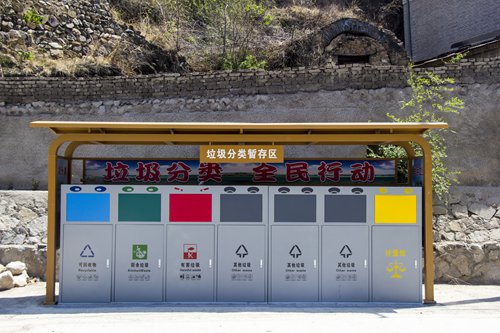HOME >> CHINA
President Xi urges trash sorting habit
By Deng Xiaoci Source:Global Times Published: 2019/6/3 22:03:40
Govt ready to battle ineffective classification in the long run

A group of bins for garbage classification in Sangyu village, Mentougou district, Beijing on May 9. Photo: IC
Chinese President Xi Jinping urged efforts to cultivate a good habit of garbage classification, which Chinese observers said is the most urgent, effective and enduring measure to sustain the practice in the long run.
Xi, also general secretary of the Communist Party of China Central Committee and chairman of the Central Military Commission, made the remarks in an instruction on garbage sorting, the Xinhua News Agency reported on Monday.
The key to carrying out waste sorting is to strengthen scientific management, form a mechanism with lasting effects, and cultivate the habit of waste sorting, Xi said.
Chinese environment management experts on Monday hailed Xi's speech which indicates the government's readiness to deal with garbage sorting issues through long and solid efforts rather than simply pursuing instant but short-term results.
Luo Yameng, a Beijing-based urbanization expert, said a complete garbage classification and disposal system would be composed of three key stages: garbage classification dumping, classification transfer and classification disposal.
Failure of any stage would cost the whole system, Luo said.
"Developing residents' habit of garbage sorting is the most challenging part, which takes time; and judging from Xi's key speech, we can tell that the government is ready to focus on the process," Liu Jianguo, a professor specializing in solid waste management at Tsinghua University, told the Global Times.
China has been stepping up efforts to build a national garbage sorting system in recent years, initiating pilot programs in 46 major cities to cover all prefecture-level cities before the end of 2025 with the basic garbage classification and disposal systems.
Beijing municipal authorities recently announced the roll-out of a compulsory garbage sorting mechanism in public areas, vowing to set up garbage sorting demonstration areas that cover 60 percent of the city.
Besides, incentives to encourage the practice of garbage sorting would be introduced, such as establishing a point management system and a credit account special for garbage sorting.
Regulations and incentives at the city level could contribute to building an atmosphere of promoting garbage sorting, but it cannot compare to public awareness and forming a good habit in terms of maintaining the effects in the long run, Liu noted.
Eastern Chinese city of Hangzhou and northeastern city of Changchun have also included the garbage classification into the textbooks at their elementary and middle schools as part of the national efforts.
A national survey report, which includes a total of 13,085 residents from 31 provincial regions, issued by the Policy Research Center for Environment and Economy of the Ministry of Ecology and Environment in April shows that only 30 percent respondents considered themselves "good" or "very good" in the practice of garbage sorting.
Furthermore, 63.7 percent of the respondents complained that it was the "lack of garbage sorting bins in their residential compounds" that affected their garbage sorting behavior, according to the survey.
Posted in: SOCIETY